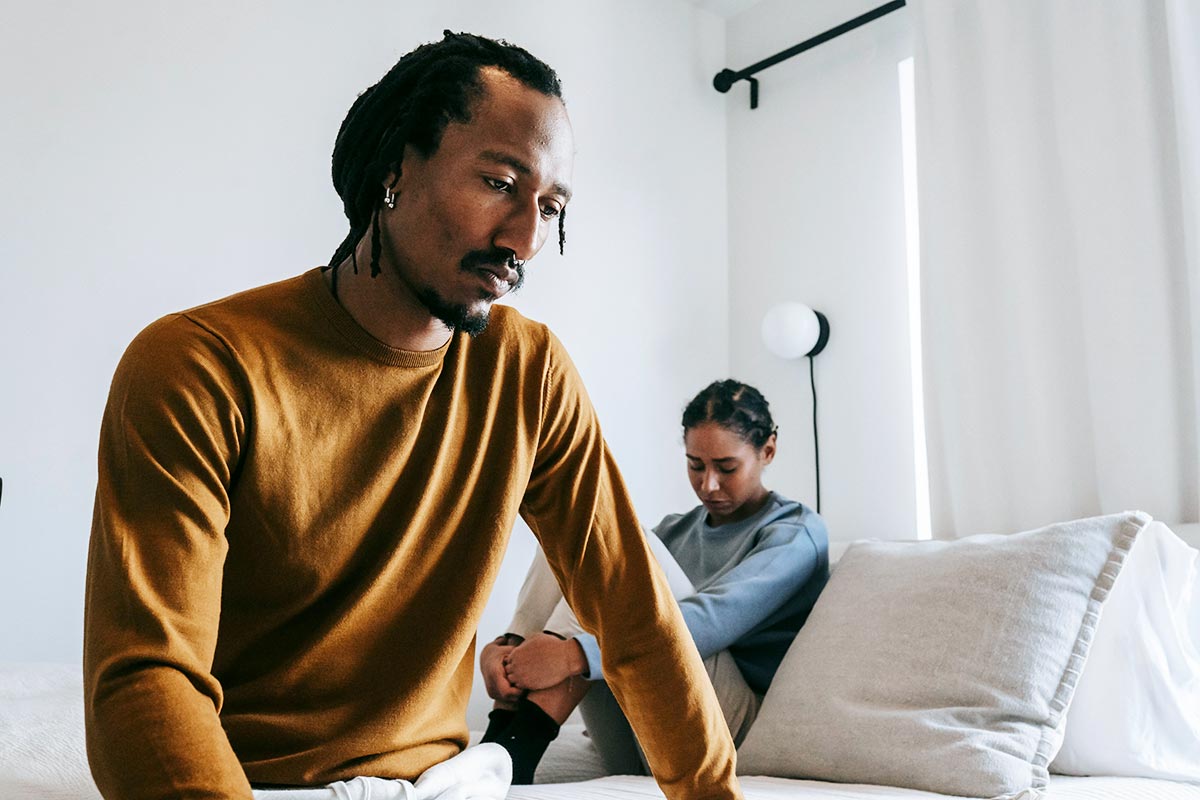
For most of us, the picture of an addict brings up someone who doesn’t function, who perhaps doesn’t have a home, and who doesn’t have a job. So, learning that people in your life, including people you are dating, are struggling with addiction can be a massive shock.
Addiction is a normal part of life for 48.7 million Americans. That means that 17.3% of the population, or nearly 1 in 5 Americans, has an “addiction”. It’s perfectly normal to work with, date, and be intimate with people who have drug and alcohol addictions.At the same time, figuring out what to do with that knowledge is a harder step. Do you break up with them? Do you try to get them into treatment? Is it your responsibility to take care of them? Should you be creating as much distance as you can?Unfortunately, there are no easy answers, but you can take a lot of steps that take both yourself and your partner into account.
Stay Safe
The first thing you should keep in mind is that people facing addictions can be unpredictable. If you aren’t sure how your partner is going to react, you should be careful. You should also take steps to ensure you’re taking care of your own mental health. That means:
- Making space for yourself and your feelings
- Not turning into a caretaker
- Not making yourself uncomfortable for the sake of your partner
- Not agreeing to lie or hide substance abuse for your partner
- Taking time and space out when things get stressful
- Breaking up if you feel uncomfortable dating an addict
- Seeking out therapy and trauma therapy and thereby recognizing that this is a traumatic experience for you
If you find yourself over extending, taking on all of the responsibilities in the relationship, or constantly being unhappy because of your partner, it’s okay to break up. Even if you love them, you shouldn’t be ruining your life for someone else.
It’s also important to keep in mind that addiction changes people. Once someone goes to therapy and gets help, they are going to be a different person. Holding out for getting someone you used to know back or expecting that your partner is the same before and after therapy is only going to result in self-harm.
Understand Your Boundaries and Capabilities
You’ll have to set boundaries with your partner, decide if you want to stay with them, and decide if you can even be fair to them in a relationship. Before you do, you should figure out answers to questions like:
- What are you comfortable with around drug and alcohol use?
- Can you approach substance abuse from a perspective of nonjudgement? E.g., seeing it as a disorder and something that needs medical treatment?
- Can you take an approach of harm reduction (my partner will use x substance so the important thing is that they use it as safely as possible until they can get treatment)
- Decide how much addiction and the resulting behaviors make you uncomfortable

That can mean realizing that you see addiction as a shameful personal choice and that you can’t change that, and therefore can’t date this person. It can also mean realizing you don’t have the mental health or the stability to deal with someone who will be an emotional rollercoaster who needs a lot of extra support and care. It may mean realizing that you invest too much into caring for people and it’s not healthy for you. It may also mean realizing you have to set very good boundaries that may mean seeing your partner less or even breaking up with them.
Whatever that leads to, it’s important that you go at it from a perspective of understanding yourself and what you need and then figuring out how that works with what your partner needs in that time.
Get Your Questions Answered
Our expert & caring staff on site are available 24/7. Call us today.

Talk to Your Loved One
It’s important to talk to your loved one and set boundaries and expectations. That won’t be easy. It may also involve confronting your loved one with their addiction. That can be difficult, and it can end up being a very emotional and even confrontational conversation. At the same time, you need that conversation to decide what to do.
- Set boundaries and state what you can take and why. Try to be gentle but be firm and clear about your needs. Set hard boundaries where you can follow up on them. E.g., if you say “I need you to not come home completely drunk” you have to be able to follow up and step out of the situation if your partner comes home completely drunk.
- Good boundaries look like “I need X to be able to be comfortable and happy”. E.g., “I need to have a partner I can rely on, and that means I need you to follow through on promises when you make them, if you can’t do that, I will stop accepting promises from you”.
- Set communication guidelines. That can mean siting down and talking, sharing when your partner is off using or drinking, avoiding heated conversations, avoiding name-calling, etc.
- Share any steps you are taking to protect yourself. E.g., “I won’t share finances with you”, or “I don’t feel you can be reliable with chores so I won’t share them with you or live with you”.
- Try to be clear about what your wants for the future are, ask those from your partner, and try to create a plan for the future.
- Try to stay calm. People who are addicted to substances can be avoidant, violent, moody, and irritable. They can respond to what seem like perfectly reasonable statements by being completely unreasonable. It’s important that you Sitting down to have a discussion will help you both understand what to expect from the other. However, it’s important to keep in mind that addiction can make honesty around that difficult. You might find that you set clear expectations with your partner and they don’t follow up or act as though the conversation was never had.
Seek Out Help
Taking time to understand addiction, how it works and what help looks like is important if you want to stay with your partner. Even if you’re casually dating, you’ll want to know what addiction is and what treatment looks like. That means taking time to learn about addiction, to learn about treatment options, and to try to talk to your partner about them.At the same time, it’s not your responsibility to get your partner into treatment. You also can’t make them make better choices or get help. You can offer to help, you can be supportive, and you can be nonjudgemental, but you can’t make them motivated to get clean or sober.You’ll also want to consider getting help for yourself. Living with or dating someone with a substance use disorder can be highly traumatic.

It’s not easy to invest in someone who can’t invest fully in you. Seeking out therapy, attending groups like Al-Anon, and otherwise working towards ensuring you have space for your own mental health will be important if you stay dating your partner.
Addiction is a behavioral disorder that legally qualifies as a temporary disability. The person you’re dating is very sick. You don’t have to stay with them, you don’t have to take responsibility, and you should make sure you take care of your own mental health and wellbeing if you stay with them. Dating an addict can be difficult and traumatic, however, there are no right answers except to try to approach the situation with nonjudgement, to make sure you’re taking care of yourself as well, and to ask for help for yourself and your partner wherever you can.






